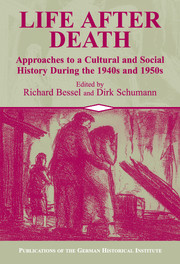Book contents
- Frontmatter
- Introduction Violence, Normality, and the Construction of Postwar Europe
- 1 Post-Traumatic Stress Disorder and World War II
- 2 Between Pain and Silence
- 3 Paths of Normalization after the Persecution of the Jews
- 4 Trauma, Memory, and Motherhood
- 5 Memory and the Narrative of Rape in Budapest and Vienna in 1945
- 6 “Going Home”
- 7 Desperately Seeking Normality
- 8 Family Life and “Normality” in Postwar British Culture
- 9 Continuities and Discontinuities of Consumer Mentality in West Germany in the 1950s
- 10 “Strengthened and Purified Through Ordeal by Fire”
- 11 The Nationalization of Victimhood
- 12 Italy after Fascism
- 13 The Politics of Post-Fascist Aesthetics
- 14 Dissonance, Normality, and the Historical Method
- Index
9 - Continuities and Discontinuities of Consumer Mentality in West Germany in the 1950s
Published online by Cambridge University Press: 05 January 2013
- Frontmatter
- Introduction Violence, Normality, and the Construction of Postwar Europe
- 1 Post-Traumatic Stress Disorder and World War II
- 2 Between Pain and Silence
- 3 Paths of Normalization after the Persecution of the Jews
- 4 Trauma, Memory, and Motherhood
- 5 Memory and the Narrative of Rape in Budapest and Vienna in 1945
- 6 “Going Home”
- 7 Desperately Seeking Normality
- 8 Family Life and “Normality” in Postwar British Culture
- 9 Continuities and Discontinuities of Consumer Mentality in West Germany in the 1950s
- 10 “Strengthened and Purified Through Ordeal by Fire”
- 11 The Nationalization of Victimhood
- 12 Italy after Fascism
- 13 The Politics of Post-Fascist Aesthetics
- 14 Dissonance, Normality, and the Historical Method
- Index
Summary
On May 2, 1954, the following cigarette advertisement was published in the German weekly Stern:
Life is worth living again. Behind us lie years that seem like a bad dream today. Sorrow was knocking on everyone's door and many hearts were in the grip of despair and hopelessness. We were in such dire straits that we did not hold life in high esteem anymore - life almost had lost its meaning! The natural consequence was the loss of even the most basic moral standards, in accordance with which we otherwise arrange our thoughts and lives. For us, even an everyday requirement such as eating got a completely excessive value; everyone was obsessed with the idea of somehow getting something to eat. Likewise we lusted after alcohol and nicotine. We indulged in the pleasures of life without moderation and restraint, and barely gave a thought to the fact that at some point we would have to pay for this mindless undertaking, that one day our organism would cease to cooperate and would confront us with a hefty bill. In the meantime, many things have changed entirely. Life is worth living again, and we again regard health as the supreme good. We have returned to accepting those limits of pleasure that Goethe called the hallmark of the master. We no longer live without thinking of tomorrow.
This text is striking not only because it advertises cigarettes in an unusual way but also because it acknowledges the end of the postwar era nine years after the war. The currency reform had marked the decisive change from the years of hardship and scarcity, and therefore was elevated in the collective memory of West Germans to the “myth of the origin of the golden age” (Lutz Niethammer).
- Type
- Chapter
- Information
- Life after DeathApproaches to a Cultural and Social History of Europe During the 1940s and 1950s, pp. 211 - 230Publisher: Cambridge University PressPrint publication year: 2003
- 2
- Cited by

